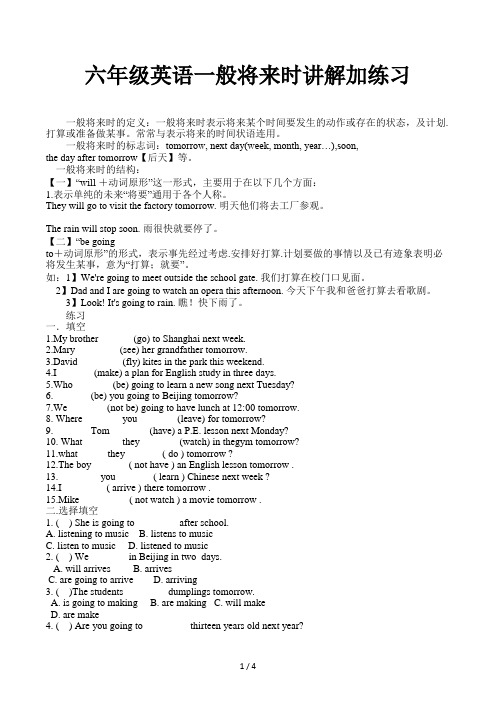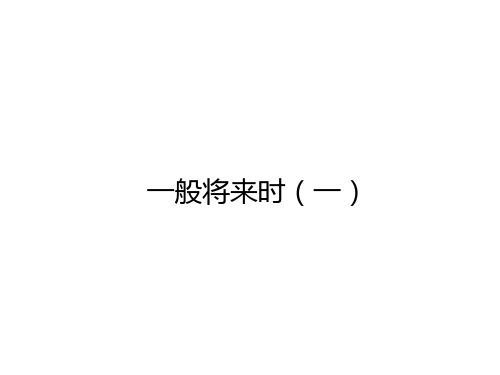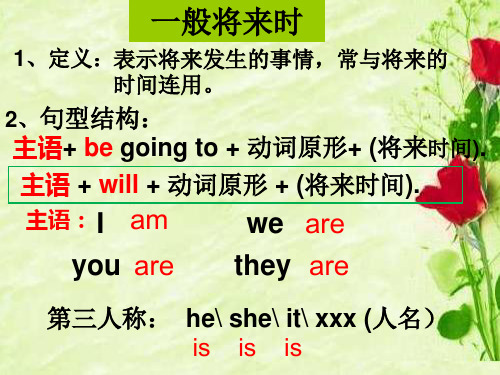广州六年级下U4语法 一般将来时
时态之一般将来时(课件)人教PEP版英语六年级下册

there be句型遇上一般将来时
(1)含be going to的there be句型 其结构是“There be going to be+主语+其他.”,意为“将会有……”, 其中to后的be是there be句式中的be,不能用have()。
今晚将会有一场英文电影。 There is going to have an English film this evening. () There is going to be an English film this evening. ()
2. 时间标志词:
3.基本结构: be going to+动词原形 will +动词原形
the day after tomorrow(后天) tonight(今晚)
this evening(今天晚上), this afternoon(今天下午)
tomorrow(明天),
tomorrow+时间
next+时间 下一个……
小熊同学
对划线部分提问技巧四步曲:一变二代三换四抄 1. 将句子变为一般疑问句 2. 找特殊疑问词代替划线部分(若划线部分是动词,则要加上do/doing) 3. 把特殊疑问词换到句首 4. 其它部分抄下来
1. I am going to draw pictures with Tom next week.(对划线部分提问) ________ are you _________ __________ _________ with Jack?
He will visit his grandparents next weekend.
明天我打算去打篮球。
I will play basketball tomorrow.
一般将来时的知识点六年级

一般将来时的知识点六年级知识是静态的,人有了知识,还应该明白如何正确地将所掌握的知识在实践中加以应用,没有智慧,充其量不过是一本记载着知识的书。
下面小编给大家分享一些一般将来时的知识点归纳六年级,希望能够帮助大家,欢迎阅读!一般将来时的知识六年级1.shall用于第一人称,常被will 所代替。
will 在陈述句中用于各人称,在征求意见时常用于第二人称。
Which paragraph shall I read first? 我先读哪一段呢?Will you be at home at seven this evening? 今晚七点回家好吗?2. be going to +不定式,表示将来。
a. 主语的意图,即将做某事。
What are you going to do tomorrow? 明天打算作什么呢?b. 计划或安排要发生的事。
The play is going to be produced next month。
这出戏下月开播。
c. 有迹象要发生的事。
Look at the dark clouds, there is going to be a storm. 看那乌云,快要下雨了。
3.be +不定式表将来,按计划或正式安排将发生的事。
We are to discuss the report next Saturday. 我们下星期六讨论这份报告。
4.be about to +不定式,意为马上做某事。
He is about to leave for Beijing. 他马上要去北京。
注意:be about to do 不能与tomorrow, next week 等表示明确将来时的时间状语连用。
5.一般现在时表将来。
a. 下列动词come,go,arrive,leave,start,begin,return 的一般现在时可以表示将来,主要用来表示在时间上已确定或安排好的事情。
The train leaves at six tomorrow morning. 火车明天上午六点开。
六年级英语一般将来时讲解加练习

六年级英语一般将来时讲解加练习一般将来时的定义:一般将来时表示将来某个时间要发生的动作或存在的状态,及计划.打算或准备做某事。
常常与表示将来的时间状语连用。
一般将来时的标志词:tomorrow, next day(week, month, year…),soon,the day after tomorrow【后天】等。
一般将来时的结构:【一】“will +动词原形”这一形式,主要用于在以下几个方面:1.表示单纯的未来“将要”通用于各个人称。
They will go to visit the factory tomorrow. 明天他们将去工厂参观。
The rain will stop soon. 雨很快就要停了。
【二】“be goingto+动词原形”的形式,表示事先经过考虑.安排好打算.计划要做的事情以及已有迹象表明必将发生某事,意为“打算;就要”。
如:1】We're going to meet outside the school gate. 我们打算在校门口见面。
2】Dad and I are going to watch an opera this afternoon. 今天下午我和爸爸打算去看歌剧。
3】Look! It's going to rain. 瞧!快下雨了。
练习一.填空1.My brother ______ (go) to Shanghai next week.2.Mary ________ (see) her grandfather tomorrow.3.David ________ (fly) kites in the park this weekend.4.I_______ (make) a plan for English study in three days.5.Who _______ (be) going to learn a new song next Tuesday?6._______ (be) you going to Beijing tomorrow?7.We _______ (not be) going to have lunch at 12:00 tomorrow.8. Where _______ you _______ (leave) for tomorrow?9._______ Tom _______ (have) a P.E. lesson next Monday?10. What _______ they _______ (watch) in thegym tomorrow?11.what _____ they _______( do ) tomorrow ?12.The boy _______( not have ) an English lesson tomorrow .13.________ you _______( learn ) Chinese next week ?14.I ________ ( arrive ) there tomorrow .15.Mike _________ ( not watch ) a movie tomorrow .二.选择填空1. ( ) She is going to ________ after school.A. listening to musicB. listens to musicC. listen to musicD. listened to music2. ( ) We _______ in Beijing in two days.A. will arrivesB. arrivesC. are going to arriveD. arriving3. ( )The students ________ dumplings tomorrow.A. is going to makingB. are makingC. will makeD. are make4. ( ) Are you going to_________ thirteen years old next year?A. will beB. areC. beD. go5. ( ) ___will see a play in 5 days?A. WhenB. WhatC. WhoD. Whose6. ( ) Mary______ English next year.A. will learnB. will to learnC. are going to learn.D. learns7. ( ) He’ll _____ shopping this afternoon.A. goingB. goC. goesD. went8. ( ) Will you ____ at the bus stop at 10:30?A. meetingB. meetsC. meetD. met9. ( ) Lily and I _______ the guitar. next week.A. am going to playB. are going to playC. will playsD. play10. ( ) How ______ Jenny ___ home tomorrow?A. does......goB. is……goingC. will……goD. do……g o11. ( ) Who is going to _________ a song ?A. sings B singing C. to sing D. sing12. ( ) I _________in Beijing in three days.A. are going to arriveB. arriveC. will arriveD. arrives13. ( ) He _______some model planes tomorrow .A. going to makeB. is makingC. will make D makes14. ( ) Are you going to ___________a doctor next year ?A. will beB.. areC. beD. are going to15. ( ) She ________ you make supper this evening .A. helpsB. will helpC. is helpingD. is going help三.把下列句子变成一般疑问句,并给出肯定和否定回答。
一般将来时(讲义)人教PEP版英语六年级下册

英语学科辅导讲义
一般将来时
1.一般将来时的定义:表示将来某一时刻的动作或状态,或将来某一段时间内经常的动作或状态
2.时间标志词:
1)tomorrow, the day after tomorrow, tomorrow morning/afternoon/evening
2)next year/week/month/hour/day/century the year after next(后年)
3)in+一段时间(★★★★★)
4)in the future
5)this afternoon/Sunday/evening
6)from now on
7)one day, someday (未来的)某天
8 )soon (★★★★★)
3.结构
主语+shall/will+ do+其他(shall用于第一人称I/we)客观上将要
主语+be going to do 人作主语,打算做某事、推测天气
主语+ be going to + do+其他
这种结构常用来表达事先考虑过打算要做的事以及已有迹象表明必将要发生的某事,意为“打算;就要”。
注意:be 动词要与主语的人称和数一致
如:I am going to read some books tomorrow.
Look! It's going to rain.
★使用be going to 结构应注意的两点
There be 句型的be going to 结构为:There is going to be... (注意句型中going to 后面的be 不能改为。
广州版小学六年级英语一般将来时

3.How will you go on your holiday?
___________________________________________________________
A. do B. am doing C. am going to do
()2. He often ___________ to school with his friend.
A. go B. goes C. going
()3. Will you ___________ noodles for breakfast tomorrow morning?
构成:
(物(第(1)第一人称:I / we) + shall+动词原形,例如:
We / I shall go to park next day.
否定形式:+shall not +动词原形,例如:
We / Ishall not go to parknext day.
提问:Shall…+动词原形…?,例如:
11. _______ you _______ (visit) the museum next Thursday?
No, I______________.
12. I___________ ________(understand) the book next week. Because I __________
9.I ____________________________________(学习)in the library one hour later.
通用版英语六年级下册一般将来时 课件 (共43张PPT)

tomorrow明天 tomorrow morning 明天早上 tomorrow afternoon 明天下午 tomorrow evening明天晚上 the day after tomorrow后天
next 系列
next time下次 next week下周 next month下个月 next summer/winter holida明年暑假/寒假 next year明年
B. going
C. goes
D. went
Summary
1.掌握一般将来时的定义 2.掌握一般将来时的结构 3.掌握一般将来时的时间标志词 4.掌握be going to+动原 和will+动原的区别 5.掌握一般将来时的句型转换 6.掌握一般将来时 的特殊用法
特殊疑问句 :特殊疑问词 + 一般疑问句?
1 I am going to swim tomorrow. What are you going to do tomorrow?
2 I am going to swim with my brother tomorrow. Who are you going to swim with tomorrow?
即学即练
4.He will paint it pink. (一般疑问句) Will he paint it pink?
5. There will be a sports meeting next week.(否定句) There will not be a sports meeting next week.
in+将来的年份(在…….年)
in+时间段 表示“m now on 从现在开始 in the future 在未来 in future 不久 before long不久之后 Soon 很快 Tonight在今晚 one day 有一天 some day某天 this afternoon/evening今天下午/晚上
小学英语六年级下册总复习《一般将来时 》课件

一般情况,一般将来时的对划线部分有三种 情况。 1. 问人。Who 例如:I’m going to New York soon. →Who’s going to New York soon. 2. 问干什么。What … do. 例如: My father is going to watch a race with me this afternoon. →What is your father going to do with you this afternoon. 3. 问什么时候。When. 例如:She’s going to go to bed at nine. →When is she going to bed?
一般疑问句
be或will提到句首,some改为any, and改为 or,第一二人称互换。 例如:We are going to go on an outing this weekend. → Are you going to go on an outing this weekend?
对划线部分提问
一般将来时
一般将来时的意义: 表示将要…..,将会做….,打算去做….. 如:它将要下雨了。 我打算去买一本书。 我们明天将会去中山公园。
提示动词
句中一般有以下时间状语:tomorrow, next day(week, month, year…),soon, the day after tomorrow(后天)
( B ) 8. – Will his parents go to see the movie tomorrow? – No, ________ (不去). A. they willn’t. B. they won’t. C. they aren’t. D. they don’t. ( B ) 9. We ________ the work this way next time. A. do B. will do C. going to do D. will doing
一般将来时(课件)人教PEP版英语六年级下册

变疑问很简单, will提到主语前, 变否定也不难, will后要把not添。
Example
Tomorrow will be April Fool’s Day. 明天是愚人节。
I will go to visit him next week.
下周我将去拜访他。
He will be twenty years old next year. 明年他就二十岁了。
5.— 明天她会去图书馆吗? — 不,她不会。 — __W__il_l _____ she go to the library tomorrow? — No, she _w__o_n_'_t ____.
一般将来时的用法:
时间标志
tomorrow 明天 soon 不久 next day 下一天 next week 下周 next month 下个月 next year 明年
未来发生事 I will go to the beach with my classmates next week. 下星期我要和同学去海滩。 They will have a picnic tomorrow. 他们明天要举行野餐。
It’s very cold. I think it is going to snow. 天气很冷,我想要下雪了。
I’m going to go fishing tomorrow. 我明天去钓鱼。
I’m going to tell you about it. 我打算告诉你这件事。
Tomorrow will be April Fool’s Day. 明天是愚人节。
一般 疑问句
难点解析
2. 表示时间、日程上所安排好 将要发生的事,用一般现在时。
School finishes on January 18th. 学期一月十八日结束。 The party starts at four thirty. 晚会四点半开始。
一般将来时讲解及练习六年级

一般将来时标志词:tomorrow,thedayaftertomorrow,nextweek,intwoyears,soon,threedayslater等结构一:willwill可用于所有人称,shall只用于第一人称I和we肯定形式:主+willdo一般疑问:will+主+do否定形式:主+won’tdo特殊疑问:what/when/where/which+will+主+doeg:1.we knowtheresultsoon.我们很快就会知道结果了;2.we knowtheresultsoon.我们不会很快就知道结果的;3. we knowtheresultsoon.我们将会很快就知道结果吗4. weknowtheresult.我们将在什么时候知道结果结构二:begoingto肯定形式:主+begoingto+do一般疑问:be+主+goingto+do否定形式:主+benotgoingto+do特殊疑问:what/when等+be+主+goingto+doeg:skyisfullofblackclouds.Itto .快要下雨了;2.ButIthinkit rain.但我觉得它不会下雨;3.it soon很快就会下雨了吗4. you to tomorrow明天你要干什么小小区别:通常情况下will和begoingto能互换will,shall多习惯用于表示是否愿意,第一人称作主语的疑问句一般用shall不用willbegoingto则多用于表示根据迹象判断将要发生某事,或者计划打算要做的事eg:1.youdrivetoschooltomorrowwemeetat8:00tomorrowattheblackcloudsIt rain.readsomebookinthelibrarythisafternoon.用现在进行时bedoing表示将来时:go,come,leave,arrive等表示位置转移的动词eg:1.UncleWang come.王叔叔就要来了;2.They leaveforBeijing.他们即将前往北京;一般将来时练习一.连词成句并按要求改变句式注意动词的正确形式1、children,at,study,home,will,on,computer,inthefuture肯定陈述句:一般疑问句:2、back,they,month,later,a,get,will肯定陈述句:否定句:一般疑问句:3、he,is,going,a,to,patty,evening,this肯定陈述句:否定句:一般疑问句:特殊疑问句问时间:4. China is a modern and strong country.in twenty years5. Do you study hardfrom now on二、用括号中词的适当形式填空1、Thebus come.Pleasewaitforaminute.2、Guangzhou 将会morebueatifulYes,3、Howyou spentyouwinterholiday4、Peoplehavelessworktodointhefuture.5、we goouttomorrowifit rain三、选择正确的答案1. Thereanimportantmeetingnextweek.A.willbeB.willhaveC.willhasD.willgoingtobe2. toEnglandtomorrow.A.flyB.flewC.isflyingD.flies3. Marywillcomebackfiveo’ter4. yougototheparktomorrowA.WillB.ShallC.DoD.Are5. . The day after tomorrow they ________ a volleyball match.A. will watchingB. watchesC. is watchingD. is going to watch6. .There ________ a birthday party this Sunday.A. shall beB. will beC. shall going to beD. will going to be7. They ________ an English evening next Sunday.A. are havingB. are going to haveC. will havingD. is going to have8. ________ you ________ free next Sunday A. Will; areB. Will; be C. Do; be D. Are; be9. He ________ there at ten tomorrow morning. A. willB. Is C. will beD. be10. ________ your brother ________ a magazine from the libraryA. Are; going to borrowB. Is; going to borrowC. Will; borrowsD. Are; going to borrows作业:一、单项选择;1. There __________ a meeting tomorrow afternoon.A. will be going toB. will going to beC. is going to beD. will go to be2. Charlie ________ here next month.A. isn’t workingB. doesn’t workingC. isn’t going to workingD. won’t work3. He ________ very busy this week, he ________ free next week.A. will be; isB. is; isC. will be; will beD. is; will be4. There ________ a dolphin show in the zoo tomorrow evening.A. wasB. is going to haveC. will haveD. is going to be5.–________ you ________ free tomorrow – No. I ________ free the day after tomorrow.A. Are; going to; willB. Are; going to be; willC. Are; going to; will beD. Are; going to be; will be6. Mother ________ me a nice present on my next birthday.A. will givesB. will giveC. givesD. give7. – Shall I buy a cup of tea for you–________. 不,不要;A. No, you won’t.B. No, you aren’. No, please don’t.D. No, please.8. – Where is the morning paper – I ________ if for you at once.A. getB. am gettingC. to getD. will get二、动词填空;1. I ______leavein a minute. I ______finishall my work before I ______ leave.2. —How long _____ you _____studyin our country—I _____planto be here for about one more year.—What ______ you ______doafter you ______leavehere—I ______returnhome and ______geta job.3. I ______betired. I ______goto bed early tonight.4. Mary’s birthday is next Monday, her mother _____giveher a present.三、句型转换;1. People in the north often go skating in winter. next winter2. There are two cinemas in that town. next year3. He comes back late.in two days4.She is a conductor of a train.soon。
六年级下册英语课件-一般将来时 全国通用

答语:Yes, I am. No, I’m not.
We are going to play computer games after class.
否定:We are not going to play computer games after class.
疑问:Are you going to play computer games after class?
be going to 结构表将来
I am going to visit my parents tomorrow. Mary is going to buy some books two days later. They are going to play basketball on this weekend.
There is going to be a football match tonight. (T)
There will have a football match tonight. (F)
There will be a football match tonight. (T)
一般将来时
一、定义:将来存在的状态,将要去做的事情。
二、构成: 谓语
1、状态: 主语+will be +表语
助动词 动词原形 例如:I will be a teacher (in ten years). 否定:I will not(won’t) be a teacher (in ten years). 一般疑问:Will you be a teacher (in ten years)?
实践出真知-练习巩固
1. I will be rich in ten years. 否定:I will not be rich in ten years. 疑问:Will you be rich in ten years? 答语:Yes, I will. No, I will not. 2. We will play basketball tomorrow. 否定:We will not play basketball tomorrow. 疑问:Will you play basketball tomorrow? 答语:Yes, we will. No, we will not.
一般将来时(课件)六年下册英语人教PEP版

四、按要求完成下列各题。 1.She is going to take a trip next weekend.(对画线部分提问)
What is she going to do next weekend?
2.Oliver is going to visit me next week.(改为否定句) Oliver isn’t going to visit me next week.
— Will you meet at the bus stop at 10:30?
— No , we won’t .
5.She is going to listen to music after school. (改为一般疑问句,并作 否定回答)
— Is she going to listen to music after school?
(My parents and I, take a trip, this summer holiday) 2. He is going to/will go to the bookstore next Saturday.
(he, bookstore, next Saturday) 3. My father is going to/will go hiking tomorrow.
C.will take a trip
( C )3.It
rainy tomorrow.
A.is going
B.is going to
C.is going to be
( B )4.He
visit his grandparents this evening.
A.goes to
B.is going to
小学英语六年级语法--一般将来时

小学英语语法--一般将来时语法讲解观察句子,并进行总结。
I am going to play basketball tomorrow.I will watch TV this weekend.He is going to see a film next week.He will stay at home this afternoon.We are going to have a party tonight.We will visit the Great Wall next year.What are you going to do the day after tomorrow?What will you do in a week?考点一:一般将来时的时间标志和结构1.❀一般将来时的含义:表示将来要发生的动作,表示将来要做某事的计划或打算。
2.❀一般将来时的时间标志词有:__________________、______________________、__________________ __________________、___________________________, _______________________________________等;3.❀一般将来时的句型结构有两种:❀主语+ _______________________ + __________ (原型)❀主语+ ___________________ + ___________ (原型)❀主语+ ________________ + ___________ (原型) 注意主语使用______________________;一般将来时检测一、单项选择。
( )1.We a class meeting in the park next week.A.is going to haveB.are going to haveC.is going to beD.are going to be ( )2.I go to the park to take a walk.A.amB.isC. will beD.will( )3.Everyone to their teacher in the classroom.A.are listeningB.is listeningC.listenedD.listen( )4.It will very hot tomorrow.A.isB.beC.going to beD./( )5. you shopping this Sunday?A.Will, go toB.Are, goingC.Shall, go toD.Will, goes1.I (wash) my clothes this evening.2.Mary (visit) her grandparents next month.3.The boy (come) to my house the day after tomorrow.4.We (fly) a kite in the park next Sunday.5.I (be) a doctor in the future.(在将来)三、按要求改写句子。
通用版英语六年级下册语法之一般将来时详解及练习课件

She is going to the zoo tomorrow.
How can we express the Simple Future Tense
be going to:通过某种迹象可以估计将 要产生的事情。
Look ! There are so many clouds in the sky. It's going to rain. (看!天空有那么多云,我想要下雨了。)
( A )5.We_____have a picnic this XXXday. A.will B.is going to C.go to
练习
( C )6.Tom and his father will_____see his grandfather next week. A.going to B.is going to C.go to
注意缩略式: will not =won't
How can we express the Simple Future Tense
2.否定句: 主语&sth.
肯定句:I am going to go to school tomorrow. 否定句:I am not going to go to school tomorrow.
练习
1.He ___D_____ very busy this week, he ________ free next week. A.will be; is B. is; is C. will be; will be D. is; will be
练习
2.He ____C____ in three days. A. coming back B. came back C. will come back D. is going to coming back
六年级小学英语一般将来时ppt课件

tomorrow(明天) tonight = this evering(今晚) this morning(今天上午 ) this aftenoon(今天下午 )
next week (下周 ) next weekend (下周末 ) the day after tomorrow(后天 )
采用PP管及配件:根据给水设计图配 置好PP管及配 件,用 管件在 管材垂 直角切 断管材 ,边剪 边旋转 ,以保 证切口 面的圆 度,保 持熔接 部位干 净无污 物
4. 将来时态的特殊疑问句:
句型:疑问词+be动词+主语
+going to+动词原形+将来时 间?
be
going 采用PP管及配件:根据给水设计图配置好PP管及配件,用管件在管材垂直角切断管材,边剪边旋转,以保证切口面的圆度,保持熔接部位干净无污物
主语 + will + 动词原形 + (将来时间).
主语: I am
we are
you are they are
第三人称: he\ she\ it\ xxx (人名) is is is
பைடு நூலகம்
采用PP管及配件:根据给水设计图配 置好PP管及配 件,用 管件在 管材垂 直角切 断管材 ,边剪 边旋转 ,以保 证切口 面的圆 度,保 持熔接 部位干 净无污 物
采用PP管及配件:根据给水设计图配 置好PP管及配 件,用 管件在 管材垂 直角切 断管材 ,边剪 边旋转 ,以保 证切口 面的圆 度,保 持熔接 部位干 净无污 物
Exercise for you!练习
采用PP管及配件:根据给水设计图配 置好PP管及配 件,用 管件在 管材垂 直角切 断管材 ,边剪 边旋转 ,以保 证切口 面的圆 度,保 持熔接 部位干 净无污 物
一般将来时(FutureTenses)(讲义)通用版英语六年级下册

一般将来时(Future Tenses)讲义Grammar – future simple(将来一般时态)(will + 动词原型)Affirmative(肯定方式): I will play / You will play / He/she/it will play / We will play / You will play (pl.) / They will playꢀNegative(否定方式): I will not play / You will not play / He/she/it will not play / We will not play / You will not play / They will not playꢀQuestion(疑问句): Will I play? / Will you play? / Will he/she/it play? / Will we play? /Will you play? / Will they play?Some people have been taught that 'will' is 'the future' in English. This is not correct. Sometimeswhen we talk about the future we cannot use 'will'. Sometimes when we use 'will' we are not talking about the future.We can use 'will' to talk about future events we believe to be certain.•The sun will rise over there tomorrow morning.•Next year, I'll be 50.•That plane will be late. It always is.•There won't be any snow. I'm certain. It's too warm.Often we add 'perhaps', 'maybe', 'probably', 'possibly' to make the belief less certain.•I'll probably e back later.•He'll possibly find out when he sees Jenny.•Maybe it will be OK.•Perhaps we'll meet again some day.We often use 'will' with 'I think' or 'I hope'.•I think I'll go to bed now.•I think she'll do well in the job.•I hope you'll enjoy your stay.•I hope you won't make too much noise.We use 'will' at the moment we make a new decision or plan. The thought has just e into ourhead.•Bye. I'll phone you when I get there.•I'll answer that.•I won't tell him. I promise.Grammar – future simple(将来一般时态)(be (is, am are) going to +动词原型) Affirmative(肯定方式): I am going to play / You are going to play / He/she/it is going to play / We are going to play / You are going to play / They are going to playꢀNegative(否定方式): I am not going to play / You are not going to play / He/she/it is not going to play /We are not going to play / You are not going to play / They are not going to playꢀQuestion(疑问句): Am I going to play? / Are you going to play? / Is he/she/it going toplay? / Are we going to play? / Are you going to play? / Are they going to play?The one which is used most often in spoken English is 'going to', not 'will'.We use 'going to' when we want to talk about a plan for the future.•I'm going to see him later today.•They're going to launch it next month.•We're going to have lunch first.•She's going to see what she can do.•I'm not going to talk for very long.Notice that this plan does not have to be for the near future.•When I retire, I'm going to go back to Barbados to live.•In ten years’ time, I'm going to be boss of my own successful pany.We use 'going to' when we want to make a prediction based on evidence we can see now.•Look out! That cup is going to fall off.•Look at those black clouds. It's going to rain soon.•These figures are really bad. We're going to make a loss.•You look very tired. You're going to need to stop soon.We can replace 'going to go' by 'going'.•I'm going out later.She's going to the exhibition tomorrow.Grammar – future continuous (will +be + ing)Affirmative(肯定方式): I will be doing / You will be doing / He/she/it will be doing / We will be doing / You will be doing (plural)/ They will be doingNegative(否定方式): I will not be doing / You will not be doing / He/she will not bedoing / We will not be doing / You will not be doing / They will not be doingQuestion(疑问句): Will I be doing? / Will you be doing? / Will he/she/it be doing? / Willwe be doing? / Will you be doing? / Will they be doing?We can use 'future continuous' to talk about something that will be in progress at a particularmoment in the future.•This time next week, I'll be sitting on the beach in Barbados.•I'll be thinking about you all back in the office – and I'll be laughing.•We'll be enjoying ourselves too, boss. We won't be doing any work while you are not here.To talk about future events that are fixed or decided.•I'll be visiting your country on a regular basis. In fact, I'm going to be ing next month.•He'll be looking after the factory until we can appoint a new manager.•They'll be thinking about this very carefully over the next few months.To predict what is happening now.•Try phoning his hotel. He'll probably still be having breakfast.•They'll be deciding who gets the contract at this very moment. I'm very nervous.•She's not in her office. She'll be having lunch in the canteen.To ask extremely politely, and with no pressure, about future plans.•Will you be eating with us this evening?•Will you be needing anything else?• Will they be joining us for dinner?Fill in the correct form of the Future Tense. In some sentences several forms are possible.填写正确的将来时形式。
一般将来时(讲义)教科版(广州)英语六年级下册

一般将来时一、意义:表示将来某个时间要发生的动作或存在的状态,也表示将来经常或重复发生的动作,常与表示将来的时间状语连用。
如:tomorrow , soon ,next Monday , next year , next weekend , this afternoon , this evening ……二、构成:be going to+动词原形: 表示打算、准备做的事或即将发生或肯定要发生的事。
will+动词原形: 表示将要发生的动作或情况,没有太多的计划性, 还用来表示意愿。
三、变化1)be going to +动词原形将要做某事1.肯定句:主语+be(am /,is,/ are) going to +动词原形+其它成份My sister is going to learn English next year. 我姐姐准备明年学英语。
我爸爸打算明天回来。
翻译:______________________________2.否定句:主语+be(am / is / are)not going to +动词原形+其它成份I am not going to(go to)the cinema tonight. 我今天晚上不打算去看电影。
Linda is going to climb mountains tomorrow.改为否定句:3.一般疑问句:Be (am / is / are)+主语+going to+动词原型+其它成份Is your father going to play basketball with you ?你父亲打算和你去打篮球吗?肯定回答:Yes,he is. 否定回答:No , he isn’t.I am going to climb mountains tomorrow.改为否定句:肯定回答:否定回答:4.特殊疑问句特殊疑问词(Wh)+一般疑问句?Where are you going to spend Spring Festival.? 春节你打算在哪过?I am going to climb mountains tomorrow.改为特殊疑问句:____________________________________I am going to climb mountains tomorrow.改为特殊疑问句:____________________________________Be going to 句型专项练习一、单项选择题( )1、I am going to_________ a football player.A. /B.isC.be( )2、We are going to ________ games.A.playB. playingC.plays( )3、________ is going to finish the work?A. WhatB.WhoC.What( )4、We are going to ________ a picnic next Saturday.A. hasB.haveC.had( )5、They are going to________ .A. going shoppingB. go shoppingC.goes shopping( )6、They aren't going________ shopping.A. to goB. goC./( )7、Are they going to ________ shopping?A. to goB. goC./( )8、She is going to________ basketball.A. playB. playingC.plays二、用正确的形式填空(用be going to 正确形式填空)。
一般将来时(课件)-2021-2022学年英语六年级下册

单项选择。
( )1.-Where_____ your brother go tomorrow? —He will go to my uncle's house. A. did B. does C.wll D. do
( )2.It____rainy tomorrow. A. is going B. is going to be C. going to be D. is going to
4.这周末我们将举行一次聚会。(根据汉语意思完成句子) We _______ ________a party____ ________.
பைடு நூலகம் 连词成句。
1.the.is,going,weekend,to,on,what,he,do(?) 2.to,this,park,the,is,going,Friday,she(.) 3.the,will,how,you,go,to,cinema(?) 4.tomorrow,they,are,where,going(?) 5.Kate,will, to,post,the,next,office,week,go (?)
Exercise 3
1.Will they _______(do)homework this evening. 2.What ________(be)your father going to do this evening. 3.We_________(be) going to _________(watch)TV tonight. 4.She_______go to Shanghai tomorrow morning.
1.be going to+动词原形
表示打算,准备做某事,be动词随着前面主语变化而变化。
小学英语六年级下第四单元总结

小学英语六年级下第四单元总结一般将来时:表示将来某一时刻将要发生的动作或存在的状态.构成:1. 肯定句: 主语+will+动原 2.肯定句: 主语+be going to +动原否定句:主语+will +not +动原否定句:主语+be +not +going to +动原一般疑: Will +主语+动原? 一般疑:Be + 主语+going to+动原?肯回:Yes,主语+will. 肯回: Yes,主语+be.否回:No, 主语+will +not . 否回: No, 主语+be+not .短语和句型:go on a trip (旅行) take a plane (乘飞机) plan to do (计划做某事) the capital of (…的首都)in the north of 在…北部(内部) to the north of 在…北方(不接壤) on the north of 在…北边(接壤) far from (远离) learn a lot (学到很多) here’s +名单=this is…(这是…)one of +形容词最高级+名词复数(最…之一) all these famous places (所有这些著名的地方) would like = want 想要…Would you like+do…?= Do you want do …? 你想要做…?中外名胜古迹:West Lake Big Benthe Great Wall Tower Bridgethe Ming tombs Disneylandthe Summer Place the CN Towerthe temple of Heaven Niagara Fallsthe Forbidden City Sydney Opera House题型:(对划线部分提问)We are going to Xian. We are going to visit Big Ben tomorrow.Where are you going? When are you going to visit Big Ben?They will go to Hainan by train.How will they go to Hainan.?。
六年级英语一般将来时总结

3、问什么时候
When.例如: 她9点去游泳。 She is going to swim at nine. She will swim at nine. When will she go swimming? 她9点会去游泳吗? Is she going to swim at nine? Will she swim at nine?
五、对划线部分提问 (疑问词+一般疑问句?)
一般情况,一般将来时的对划线部分有三种情况 1、问人。Who 例如: 我正打算去学校。 I am going to school. where are you going going? 汤姆就要去学校了。 Tom will go to school. Where will tom go? 你正要去学校吗? Are you going to school?
四、一般疑问句
be动词或will提到句首,some改为any, and改为or, 第一二人称互换。 如:I am going to go swimming tomorrow. → Are you going to go swimming tomorrow? I will go swimming tomorrow. →Will you go swimming tomorrow?
否定句
在be动词(am, is, are)后加not或情态动词will后 加not成won’t 如:I am going to go swimming tomorrow. → I am not going to go swimming tomorrow. I will go swimming tomorrow. →I will not go swimming tomorrow.
- 1、下载文档前请自行甄别文档内容的完整性,平台不提供额外的编辑、内容补充、找答案等附加服务。
- 2、"仅部分预览"的文档,不可在线预览部分如存在完整性等问题,可反馈申请退款(可完整预览的文档不适用该条件!)。
- 3、如文档侵犯您的权益,请联系客服反馈,我们会尽快为您处理(人工客服工作时间:9:00-18:30)。
重要语法:一般将来时概念:一般将来时:将要发生的事情或者计划要做的事情,用一般将来时。
一般将来时的句子中经常有表示将来时间的短语tomorrow, next year等。
一般将来时的构成:be going to +动词原形一般将来时的另一种结构:will +动词原形时态特征词: (tomorrow, tomorrow+时间, next+时间, next week, next month, next year)的作用,并在做题时发挥它们的作用。
如果没有特殊的要求,在使用将来时的时候,尽量用“will+动词原形”的结构形式。
标识词、特征词:tomorrow、 tomorrow +时间、next+时间、 next week、next month、next year、from now on(从现在开始)、soon、in the future、in 2015、 in two days(两天之后)【四种句式:】1.be going to +动词原形(1).肯定句主语+be(am /,is,/ are) going to +动词原形+其它My sister is going to learn English next year. 我姐姐准备明年学英语。
(2).否定句主语+be(am / is / are)not going to +动词原形 +其它I am not going to(go to)the cinema tonight. 我今天晚上不打算去看电影。
(3).一般疑问句 Be (am / is / are)+主语+going to+动词原型+其它?Is your father going to play basketball with you ?No , he isn’t.你父亲打算和你去打篮球吗?不。
(4).特殊疑问句特殊疑问词(Wh-)+一般疑问句 ?Where are you going to spend Spring Festival.? 春节你打算在哪过?2.will /shall +动词原形(在书面语中,主语是第一人称I, we时,常用shall)(1).肯定句主语+will/shall+动词原形+其它I (shall) write to him next week. 下周我将给他写信。
(2).否定句主语 + will /shall+ not + 动词原形 +其它They wo n’t watch TV this evening。
今天晚上他们不看电视。
(3).一般疑问句 will/shall+主语 +动词原形+其它Will you stay at home with us tomorrow ?明天你和我们呆在家里好吗?(4).特殊疑问句特殊疑问词(Wh-) +一般疑问句When will your father be back? 你爸爸什么时侯回来?注意:be或will提到句首,some改为any, and改为or,第一二人称互换。
【实战训练】一、用所给的动词的适当形式填空。
(每个空只填一个词)。
1. Tomorrow, my family______ _______(have) a picnic, We ________ _______ (go) to the park to _________(go) boating.2. ___________ you _________ _________ (free) the day after tomorrow?Yes, I___________.3. Our father___________(go) to work on foot every day. But he _________ ______ (go) to work by bike tomorrow.4. Listen, the children_______ _______ (sing) in the music room. And they ________ ________ (dance) next week.5. _________ you ________ ________ ________ (visit) the Great Wall next summer holiday? No, we _________. But we _________ ________ _________ ________( swim) in the swimming pool.6. ___________ the pupils __________(go) sightseeing next Sunday?Yes, they __________. They always ___________(go) sightseeing on Sunday.7. There___________ __________(be ) a party at our school tomorrow. And they_______(have) great fun, I think.8. It ______ _______(be) a fine day tomorrow.9. Tomorrow Miss Wang_________ ________ _________ _________(leave) for New Zealand. She ___________ ___________(go) there by plane. Look, she ________ __________(buy)something to___________(eat) there.10. Look at those workers. They___________ _________(plant) trees on the hill. Theday after tomorrow, they ___________ ___________ (plant) trees near the river.11. _______ you _______ (visit) the museum next Thursday? No, I_________.12. I___________ ________(understand) the book next week. Because I __________________(read ) it tomorrow.二、选择正确的选项。
() 1. I ___________ the housework tomorrow.A. doB. am doingC. am going to do() 2. He often ___________ to school with his friend.A. goB. goesC. going() 3. Will you _______ noodles for breakfast tomorrow morning? No, I won’t.A. haveB. hasC. having() 4. Is she going to work? Yes, ___________.A. she will.B. she is.C. she does.() 5. Tomorrow is Sunday, we ___________ a picnic.A. haveB. is havingC. will have() 6. Look, the girl ___________.A. danceB. is dancingC. will dance() 7. My friends ___________ in the pool this afternoon.A. are going to swimB. will swimsC. are swimming() 8. We are going to ___________.A. skateB. go skateC. going skating() 9. Tom and Jimmy ___________ together tonight.A. are going to playB. is going to playC. am going to play() 10. The students usually ___________ books in the morning.A. readingB. readC. will read【课后练习: 】一、单项选择( )1. The animal _______ a long nose is the elephant.A. andB. ofC. withD. for( )2. The animal has no place _______ live in.A. inB. onC. atD. to( )3. People buy things _______ from the animals.A. makingB. madeC. makesD. make in( )4. They are _______ danger now. We must do something to help them.A. inB. onC. atD. to( )5. There are some ________ in the tree.A. leafB. leafsC. leavesD. leaving( )6. If we don’t do something now, they may all ________.A. disappearingB. disappearsC. disappearD. disappeared( )7. Never _______ things made from animals in danger.A. buyB. buysC. to buyD. buying( )8. Plant trees and don’t _________ the earth.A. polluteB. pollutedC. pollutingD. to pollute二、根据中文意思,把下列句子补充完整。
1. Would you like to live in _________________________(一个没有水的世界)?2. Yesterday he ___________________________(吃了一顿大餐)in that restaurant.3. ____________________________(在教室里做作业)isn’t fun for the children.4. These animals will _________________________(永远消失).5. The bowl _____________________________(由草制成的).四、根据上下文,从方框内选择恰当的档次,把短文补充完整。
